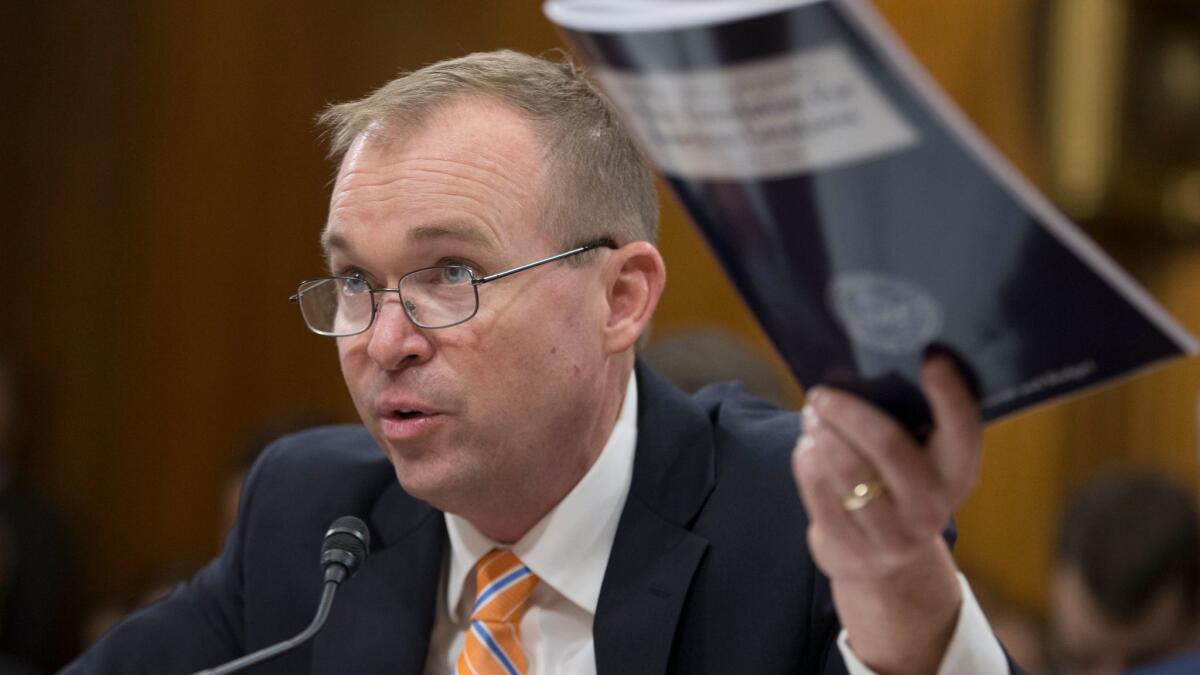Column: A billionaire’s think tank complains that Trump’s budget doesn’t cut Social Security and Medicare enough

President Trump’s budget landed with a thud this week on Capitol Hill, where even conservative Republicans pronounced it “dead on arrival” and quailed at its proposed sharp cuts to social welfare programs such as food stamps, Meals on Wheels and Medicaid.
Yet some conservatives found plenty to like in the document. Consider the reaction of the Committee for a Responsible Federal Budget, a Washington think tank heavily funded by hedge fund billionaire Pete Peterson.
“The President deserves credit for setting a fiscal goal and working to meet it,” the CRFB said in its gloss on the budget. Trump “should be commended for putting forward a number of specific and significant spending cuts to help address the debt.”
Instead of relying on phony growth and unachievable cuts, the President should focus on controlling the rising costs of Social Security and Medicare.
— Committee for a Responsible Federal Budget
But one aspect of the budget plan really stuck in CRFB’s craw: It leaves Social Security and Medicare alone. “The President should focus on controlling the rising costs of Social Security and Medicare, two of the nation’s largest and fastest growing programs, which the budget almost completely ignores.”
Followers of CRFB’s history will recognize that caveat as classic Pete Peterson. As we reported in 2012, the 90-year-old billionaire has been on a long crusade to cut Social Security and Medicare benefits. In a 1994 essay in the New York Review of Books, for example, he laid out his view that the only way to eliminate the federal deficit was by “reforming the entire system of entitlements — the fastest-growing part of the federal budget.” Where have we heard that line before?
In the piece, Peterson called Social Security, Medicare and Medicaid a “vast and largely unearned windfall we now give to the more affluent half of all American households.” By “more affluent half,” he meant all households then earning $32,000 or more. That figure would be about $53,520 in today’s dollars, close to the median income in the U.S. (In other words, after accounting for inflation, the standard of living of the median household hasn’t noticeably progressed in 23 years.)
The CRFB describes itself as “an independent source of objective policy analysis,” but in reality it’s joined to Peterson by the pocketbook. From 2012 through March 2016, the Peter G. Peterson Foundation, the billionaire’s chief pipeline of grants to nonprofits, contributed $8 million to the organization. Peterson sits on its board.
That board is replete with members of what the late muckraking journalist Jack Newfield called “the permanent government” — former members of Congress, agency heads, lobbyists, well-heeled academics, etc., etc. Their board service is unpaid. CRFB President Maya MacGuineas, a frequent speaker and editorialist on the deficit, collected about $394,000 in compensation in 2015, the latest year reported.
The CRFB’s viewpoint on Social Security typically echoes Peterson’s. Its emphasis on bringing the program into fiscal balance leans heavily on benefit cuts. Last December it praised a Social Security “permanent save” offered by conservative Rep. Sam Johnson, R-Texas, that achieved its goal entirely through benefit cuts, without a dime of new revenues such as higher payroll taxes on the wealthy.
The CRFB tends to fret about proposals to raise the payroll tax, even though removing the cap on earned income subject to the tax (currently $127,200) would deliver the single biggest improvement to Social Security’s fiscal condition of any proposal on the table. “Solvency can’t be achieved simply by making the rich pay the same as everyone else or means-testing their benefits,” the committee lectured reformers last month.
In general, the committee approaches budget matters almost entirely through the blinkers of deficit reduction, giving very little attention to the street-level consequences of budget and spending policies. That mind set bubbles through its commentary on the Trump budget, many elements of which it labels “sensible and thoughtful reforms… worthy of consideration.”
The committee doesn’t specify which policies it’s referring to. It observes that the program cuts in the budget “fall disproportionately on programs that benefit children, low-income individuals, and promote investment,” but places that caveat in the context of the “almost inevitable consequence of virtually ignoring the rapid growth of Social Security and Medicare.” The committee does acknowledge, implicitly, that the budget’s $72-billion cut in disability benefits is a Social Security cut — it specifies that it’s Social Security’s Old-Age and Survivors’ Insurance program that remains “largely untouched.”
The CRFB, to its credit, doesn’t give the Trump budget a free pass on its well-documented mathematical mendacity. Like other commentators, it labels the budget’s projection of annual growth exceeding 3% in the economy “rosy,” “extremely optimistic,” even “phony.” Responsible economic analysts place the likely annual growth rate closer to 1.8% to 1.9%.
The committee concludes, “tough choices, not wishful thinking, are needed to fix the debt.” As is typical of the analyses of this billionaire’s pet think tanks, the question it leaves unanswered is “tough for whom?” The inescapable implication is: tough on the beneficiaries of Social Security, Medicare and Medicaid. If those choices are made, the board members and officers of the Committee for a Responsible Federal Budget will do just fine.
Keep up to date with Michael Hiltzik. Follow @hiltzikm on Twitter, see his Facebook page, or email [email protected].
Return to Michael Hiltzik’s blog.
More to Read
Get the L.A. Times Politics newsletter
Deeply reported insights into legislation, politics and policy from Sacramento, Washington and beyond. In your inbox three times per week.
You may occasionally receive promotional content from the Los Angeles Times.











